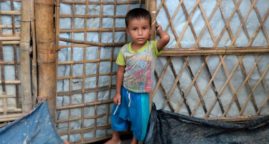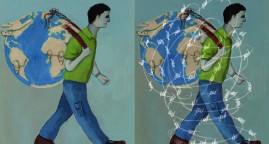U.N. releases new report on its work in Lebanon
More than a dozen high-level United Nations officials gathered Tuesday for the launch of a wide-ranging report on the organization’s work in Lebanon, the first of its kind released on the country.
U.N. Special Coordinator for Lebanon Sigrid Kaag and U.N. Resident and Humanitarian Coordinator Philippe Lazzarini chaired the briefing at the UNESCO office in Bir Hasan. Representatives from UNICEF, UNRWA, UNHCR, WHO and other programs were on hand to field questions from journalists.
The report, “U.N. in Lebanon: Year in Review 2015,” provides an overview of the U.N.’s work, from its peacekeeping mission on the Israeli border to its medical, educational and development projects. Officials emphasized the organization’s long relationship with Lebanon.
The colorfully illustrated summary is far less detailed than the annual reports produced by individual agencies, and seems intended as a more accessible explanation of the U.N.’s major role in Lebanon and the vast breadth of its assistance. The need for the organization to produce such a narrative is clear.
“We hear several requests from activists and researchers in Lebanon about the necessity of empowering the host communities in Lebanon,” said one reporter. “However, we see that the U.N. is continuously focusing on Syrian refugees only, and excluding the host communities. You’ve just said that the host communities in the majority are poor, so what’s your comment on this issue?”
“There is no response which is focusing only and exclusively on the refugees,” said Lazzarini, as he explained the evolving nature of international assistance, which has moved from emergency relief to development as the Syrian war drags on. The U.N. estimates that some 1.2 million Lebanese benefited in 2015 from a host community support program it operates with the Social Affairs Ministry.
Officials also attempted to clarify stereotypes about the refugees who the U.N. helps. “How are you working on preventing the refugee camps from turning into dens that are safe havens for terrorists and hence make Lebanon lose its stability?” another journalist asked.
“I think we need to be very cautious in making the assumption as if places where refugees reside are also hotbeds of potential radical or extremist activity,” Kaag said.
“There is always a risk, everywhere in the world, that poverty triggers a more open playing field possibly for recruitment exploitation by extremist elements of groups. This is a global phenomenon. But this is quite different than making even the indirect associations with displaced people or refugees.”
The notion that refugees are dangerous has been propagated by a number of Lebanese ministers. Such characterizations could affect public perceptions of assistance to refugee communities, of which an estimated 79 percent are women and children.
Lazzarini emphasized the U.N.’s continued commitment to Lebanon, advocating for further investment from the international community.
“There is no room for any kind of international fatigue or donor fatigue,” he said. “What Lebanon did as a host country is absolutely exceptional in any terms, and this is the reason why the support needs also to scale up and be exceptional.”
Kaag cited the importance of the country as a model of diversity, pluralism and democracy.
“I believe Lebanon is a key to a better and different Middle East.”
Article published on The Daily Star website
Related Articles
Three years since their genocide began, the Rohingya remain desperate for help
30/08/2020. There are now about 1 million people living in five refugee camps of bamboo and plastic shelters over an area equivalent to about a third of Manhattan.
Refugees pay price when governments ignore asylum rules
10/05/2017. Some politicians cast aside humanity in favour of short-term political gains.
“We have not yet realized how these new migrants are like us”
12/04/2015. In his work, the director of research at CNRS portrays a new generation of educated and graduate migrants, away from the pessimistic image often conveyed.






